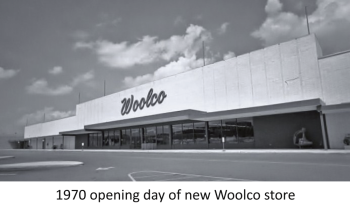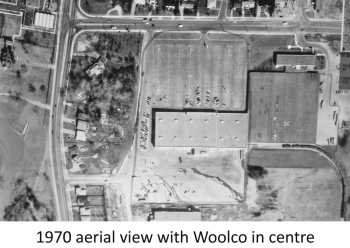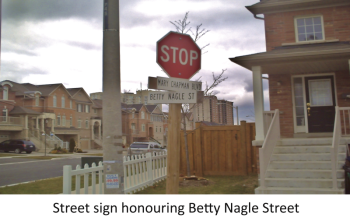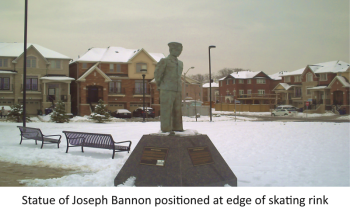
Emery’s original discount
department store
By Tim Lambrinos
By the 1970’s, a large discount department store existed near Weston and Sheppard. This department store stood just east of the intersection on the south side of Sheppard Avenue. It was built on land originally acquired in the 1800’s by Abraham Welsh. He had been fortunate enough to be the brother-in-law of Matthew Griffith who farmed on the west side of Weston Road.
During the 1950’s and 1960’s, the landscape southeast of the intersection stayed relatively rural in nature. A single bungalow ranch style home was built in 1948 and positioned angularly to the corner. The encircling property was rather unusual with a thick forest that surrounded the home. The site included an improvised hobby zoo complete with exotic animals including ostriches, peacocks, donkeys and small deer. At times, area children exploring this area occasionally found misplaced eggs. In the 1970’s, the home was the residence of the Van Ular family.
Just east in 1970, a newly constructed department store officially opened named Woolco. This Woolco store was quite large for a discount store of the time with over 100,000 square feet in total floor space. Some of their individual departments (shoes and jewelry) were leased to third-party operators, a common practice amongst discounters of the time. The stylishness of their shelves and overall interior design of their store was appealing to shoppers. At the back of the store, there was a cafeteria-style restaurant named the Red Grille. The menu had considerable variety that amazingly included snow cones, popcorn and milkshakes. On the reverberating PA system of the store, one lucky employee could be heard from time to time saying phrases like, “Ladies wear, line one please. Ladies wear, line one.” 
In 1962 in Columbus, Ohio, U.S.A., the birth of Woolco was launched by the F.W. Woolworth Company. Woolworth’s five-and-dime stores had been doing quite well but the company decided to tap into the growing discount department store market of the time. They wanted to create a modernized discount department store separate and apart from the consumer market-base of their standard store.
The growth of Woolco stores across North America coincided with the general expansion of neighbourhood suburbia. By 1966, there were just 18 Woolco stores operating in the United States with nine in Canada. But by the mid 1970’s there were over 500 Woolco stores operating throughout North America. In Canada’s smaller less crowded market, Woolco was much more popular than it was in the U.S.A. where there were 160 of the stores.
At their height, Woolco stores were considered by the company to be “promotional department stores,” with expanded product lines and other amenities not typically found at regular Woolworth stores. They even carried a much beloved children’s winter product distributed by K’Tel called “Super Slider Snowskates.” During the 1970s and 1980s, Canadian Woolco stores were well known for their monthly “$1.44 Days”, where select items were sold at a fixed price of $1.44. Eaton’s countered and competitively ran their own “$1.49 Days” typically on the first Monday of each month. Nearby Zellers also attempted their own thrifty sales campaign for merchandise.
Beginning in the late 1970s, Woolworth applied a cost-saving plan in Woolco stores that included downsizing and overall reduction in floor space at their larger locations. They also eliminated most of the leased departments and began allowing stores into smaller markets with floor space as little as 60,000 square feet.
During this time, excess space in some of the larger Woolco stores went to a Woolworth owned off-price clothing retailer called J. Brannam, which was short for “Just Brand Names.”
By 1979, it became clear that Woolworth’s earlier cost-saving attempts for Woolco would not be enough to save it from extinction. In Jan. 1983, Woolco surprisingly announced the closing of all 336 stores in the United States. At the time, Woolco’s inventory was valued at approximately $1 billion, making Woolco’s liquidation the largest in U.S. history.
In Canada, some larger Woolworth stores actually began a conversion into Woolco outlets. All 160 Woolco outlets in Canada remained open for an additional 12 years after the massive U.S. closure occurred. In 1994, Wal-Mart seemed poised and eager to finally enter into the Canadian market. That year, they bought out all Canadian outlets sealing the end of Woolco. 
Beginning in 2011, new homes were built on the land where Emery’s Woolco once stood. H&R Developments together with Lindvest Properties created the present day Westown neighbourhood. This innovative housing development introduced many families to a brand new community within Emery. Large residential homes paved the way for brand new streets. All the street names in the neighbourhood have been after prominent individuals from Emery’s history; IssacDevins, Mary Chapman, Abraham Welsh, Parotta (Gilbert), Lou Pomanti, Bob Yuill, McCartney (Carol), Ron Attwell and Betty Nagle. The last person approved for a street name in the development was Mrs. Betty Nagle. She was a very well known and devoted educator in North York who resided on Lanyard Road. To acknowledge her work ethic and dedication, she had been presented with the North York teacher of the year award in 1990. Her role as a special-education consultant and her innovative approach of applied reading skills for Corrections Canada prisoners was also recognized. She passed away on Aug. 3, 2008 at the age of 80, prior to being honoured in the street naming ceremony. Her sons Andrew, Michael and Ronald have remained most proud of their mother’s accomplishments.
Every Nov. 11th, Joseph Bannon Park has become the primary location to conduct Emery’s Remembrance Day ceremonies. 
Bannon’s statue stands prominently near the far edge of a spectacular winter skating rink. The story of his extraordinary humanitarian account undeniably enhances the entire park. Still to many of the older residents of nearby neighbourhoods, Emery’s wonderful Woolco cannot be easily forgotten.













